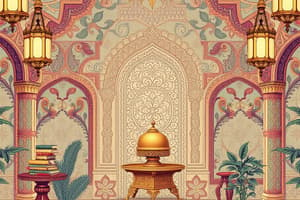Podcast
Questions and Answers
What are the 4 Purusharth?
What are the 4 Purusharth?
- Dharma (correct)
- Artha (correct)
- Moksha (correct)
- Kama (correct)
Dharma is the path to liberation or enlightenment.
Dharma is the path to liberation or enlightenment.
True (A)
What does Artha support?
What does Artha support?
Kama
Which of the following is NOT one of the 4 Varna?
Which of the following is NOT one of the 4 Varna?
Match the following Ashramas with their stages of life:
Match the following Ashramas with their stages of life:
What is the principle behind the Law of Karma?
What is the principle behind the Law of Karma?
Karma can be classified into ______ types.
Karma can be classified into ______ types.
Flashcards are hidden until you start studying
Study Notes
Historical Overview of Indian Management Thoughts
- Indian management incorporates ancient principles guiding ethical actions and life purposes.
- Four Purusharthas outline the aims of human life: Dharma (righteousness), Artha (prosperity), Kama (pleasure), and Moksha (liberation).
- Dharma is essential for achieving Artha, which supports Kama; Moksha is attained through the balance of all three.
- Key Sanskrit texts highlight the ethical framework: "Dharayati iti Dharma" signifies the importance of righteous action in society.
4 Varna System
- The Varna system categorizes society into four distinct groups, each with unique roles:
- Brahman: Intellectuals and scholars (thinkers)
- Kshatriya: Warriors and leaders
- Vaishya: Merchants and landowners (business class)
- Sudra: Service providers and laborers
- This classification, known as Chaturvarnya, is a key aspect of social organization in ancient India.
4 Ashramas (Stages of Life)
- The lifecycle is divided into four Ashramas, guiding personal development:
- Brahmacharya: The stage of education, lasting until approximately age 25.
- Grihastha: The householder phase where individuals manage family responsibilities and earn a living, typically spans until age 50.
- Vanaprastha: A transitional stage of withdrawal and introspection, focusing on spiritual practices.
- Sannyasa: The final stage marked by complete renunciation and devotion to God, symbolizing ultimate liberation from worldly ties.
Concepts of Karma
- Karma embodies the principles of action and consequence within Indian philosophy, emphasizing the interconnectedness of actions and their outcomes.
- Types of Karma include:
- Sançita: Accumulated karma from past lives.
- Prārabdha: Karma currently in effect, manifesting in present circumstances.
- Agami: Future karma based on current actions.
- Additional categories include:
- Akarma: Non-action or inaction.
- Vikarma: Negative or wrongful actions.
- The Law of Karma signifies a cause-and-effect relationship between actions and their repercussions, impacting one’s destiny.
Philosophical Insights
- Paap (sin) and Punya (virtue) define moral actions; beneficial deeds lead to positive outcomes while harmful actions yield negative results.
- Key ethical principles include "Paropakarah Punyaya, Papah Parapidnam," promoting altruism as virtuous and inflicting pain as sinful.
Studying That Suits You
Use AI to generate personalized quizzes and flashcards to suit your learning preferences.




